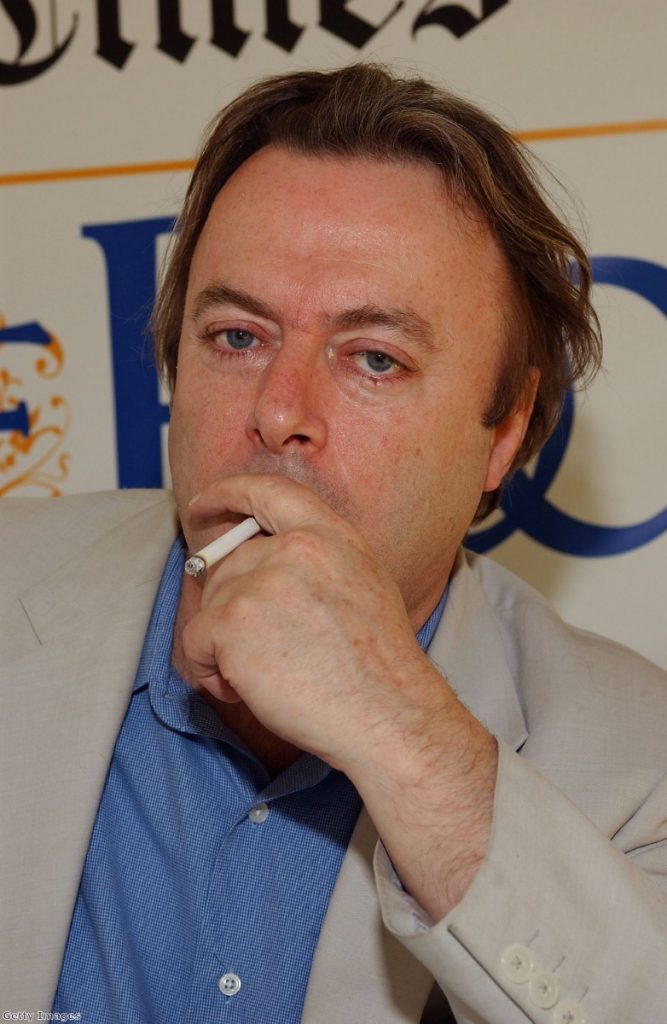‘A great heart stops’: Tributes pour in for Christopher Hitchens
By Ian Dunt Follow @IanDunt
Christopher Hitchens, one of the most influential political thinkers of his generation, has died from pneumonia, a complication of oesophageal cancer, in Texas.
Tributes have poured in from across the world and the political spectrum for the Anglo-American writer, whose independence of thought and visceral intelligence made him one of the most celebrated writers on either side of the Atlantic.
In an interview with Richard Dawkins in the forthcoming edition of the New Statesman, he describe his politics as anti-totalitarian.


"I have one consistency, which is [being] against the totalitarian – on the left and on the right," he said.
"The totalitarian, to me, is the enemy – the one that's absolute, the one that wants control over the inside of your head, not just your actions and your taxes. And the origins of that are theocratic, obviously.
"The beginning of that is the idea that there is a supreme leader, or infallible pope, or a chief rabbi, or whatever, who can ventriloquise the divine and tell us what to do."
His close friend Salmon Rushdie said: "Goodbye, my beloved friend. A great voice falls silent. A great heart stops."
Deputy prime minister Nick Clegg said: "Christopher Hitchens was everything a great essayist should be: infuriating, brilliant, highly provocative and yet intensely serious.
"I worked as an intern for him years ago. My job was to fact check his articles. Since he had a photographic memory and an encyclopaedic mind it was the easiest job I've ever done."
Tony Blair, who debated religion with Hitchens at a sell-out event in Canada last year, said: "Christopher Hitchens was a complete one-off, an amazing mixture of writer, journalist, polemicist, and unique character.
"He was fearless in the pursuit of truth and any cause in which he believed. And there was no belief he held, that he did not advocate with passion, commitment and brilliance."
Labour MP Denis McShane, who studied with Hitchens in Oxford, told the Today programme: "Christopher just swam against every tide. He was a supporter of the Polish and Czech resistance of the 1970s, he supported Mrs Thatcher because he thought getting rid of the Argentinian fascist junta was a good idea.
"He was a cross between Voltaire and Orwell. He loved words.
"He would drink a bottle of whisky when I would manage two glasses of wine and then be up in the morning writing 1,000 perfect words.
"He could throw words up into the sky, they fell down in a marvellous pattern."
The Portsmouth-born journalist started his career embedded in the radicalism of the 1960's, often being arrested at rallies and writing for International Socialism magazine. He ended it supporting the re-election of George Bush, causing many of his friends to disown him.
His politics were very complicated, but while the writer remained economically on the left, he was profoundly affected by the September 11th terrorist attacks and what he termed 'Islamo-fascism'.
Any new found support he gained from US neo-conservatives was quickly dispelled when he campaigned relentlessly against American interrogation tactics however, including one event when he subjecting himself to water-boarding.
His book, 'God Is Not Great', became massively successful in the US and quickly made him the country's most famous atheist. He decided against the traditional book circuit and instead toured the deep south of the country challenging pastors to debate with him on religion.
Hitchens wrote for a variety of publications, including The Times Literary Supplement, the Daily Express, the London Evening Standard, and The Atlantic. But his main outlet was Vanity Fair, whose editor, Graydon Carter, described him as "a wit, a charmer and a troublemaker".
Another close friend, the novelist Ian McEwan, said: "Right at the very end, when he was at his most feeble as this cancer began to overwhelm him, he insisted on a desk by the window
"Took myself and his son to get him into that chair – with a pole and eight lines going into his body – and there he was, a man with only a few days to live, turning out three thousand words to meet a deadline."
Hitchens is survived by his wife, Carol Blue, their daughter Antonia, and two children from a previous marriage, Alexander and Sophi.

